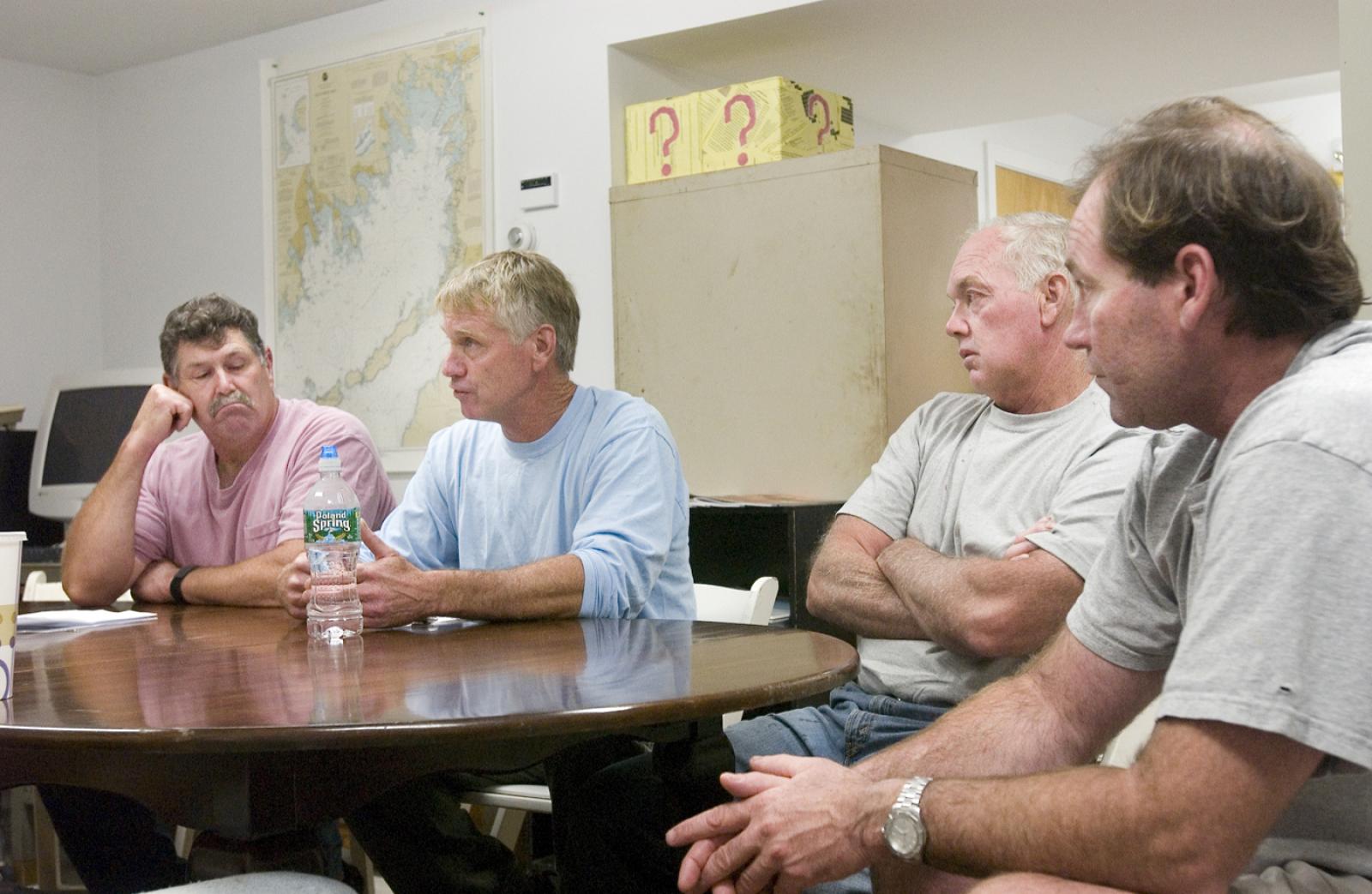Like David against Goliath, the Martha’s Vineyard/Dukes County Fishermen’s Association and a well-known Menemsha draggerman last week filed a lawsuit in federal court against the U.S. Secretary of the Interior, claiming that the giant wind farm planned by Cape Wind Associates for Horseshoe Shoal in Nantucket Sound threatens to put Island fishermen who work the shoal, including squidders and conchers, out of business for good.
“The lease . . . to [Cape Wind Associates for 130 turbines] will effectively end all commercial fishing in the project area.
“Horseshoe Shoal . . . [has] the best grounds for the conch fishery, which is the largest fishery on Martha’s Vineyard in terms of landed tonnage and economic value,” the lawsuit declares in part.
Written by David E. Frulla, a partner at Kelley Drye & Warren in Washington, D.C., the 14-page complaint was filed in U.S. District Court last Friday. Plaintiffs in the case are the association, which represents about 100 commercial fishermen, and Jonathan Mayhew of Chilmark, who operates the Quitsa Strider out of Menemsha and trawls Horseshoe Shoal for squid.
“Development of the Cape Wind Energy Project will cause an effective closure of prime, historic fishing grounds on Horseshoe Shoal . . . particularly for the smallest fishing vessel operations manned by only one person,” the complaint says.
The Vineyard fishermen join a group of six who filed a separate lawsuit in federal court late last week against Interior Secretary Kenneth Salazar. Filed in time to meet a statutory deadline, both complaints challenge the Interior Secretary’s formal Record of Decision allowing a lease to Cape Wind in federal waters, issued April 28 and the final federal regulatory hurdle for developer Jim Gordon’s wind farm which has been 10 years in planning. The other complaint is led and organized by the chief opposition group to Cape Wind, the Alliance to Protect Nantucket Sound.
But unlike the Alliance, the Vineyard fishermen have no money, only a passion and resolve to defend their livelihood, which is already on the ropes amid a New England fishery in a state of decline.
“The conditions to be imposed on commercial fishing activity within the [Cape Wind] project area will force [Mr.] Mayhew to adjust his fishing operations and practices in manners that will make trawling in the . . . area an uneconomic and even fruitless endeavor,” the complaint says.
The fishermen’s association, which is unincorporated and organized as a nonprofit under the auspices of the county, is made up of a group of small-scale commercial fishermen who banded together a little over a year ago to advocate for the interests of the fishermen.
In May, fishing association members met with Audra Parker, president and chief executive officer of the Alliance, about whether and how to take some legal action following Secretary Salazar’s decision giving Cape Wind the go-ahead. At the time Ms. Parker told the association that the Alliance would help pay for legal fees.
But Warren Doty, chairman of the association, said this week that subsequent to the May meeting, a lot of phone calls were made and meetings were held at Menemsha Cafe. In the end he said the association decided to go its own way with a lawsuit that specifically targets the interests of the fishermen. “We have signed a letter of cooperation to share information with the Alliance, but ours is an independent lawsuit. We are interested in fisheries issues and if Cape Wind moves to another spot that doesn’t affect fishing, we will go along with it,” Mr. Doty said.
Among other things, the lawsuit zeroes in on a complicated bit of procedure that resulted in Coast Guard conditions on the Cape Wind plan being filed after the final environmental impact statement (EIS) was issued for Cape Wind, leaving no opportunity for public comment on them. Among the conditions are a requirement that small vessels in the wind farm area, planned for 25 square miles on Horseshoe Shoal, add an extra crew member to serve as a watch, or lookout. The reason for this was the Coast Guard’s determination that the wind turbines will interfere with radar on vessels. For safety reasons, the Coast Guard conditions also require the establishment of prescribed traffic lanes within the wind park at sea.
In the complaint Mr. Frulla writes that these conditions, especially the extra watch, will create “crippling economic impacts” for small fishermen. “The sum of these conditions will be virtually to close vital fishing grounds to traditional fishermen operating in the area,” he wrote.
Mr. Doty reported on the filing of the court complaint at a meeting of the fishermen’s association on Tuesday night this week.
Mr. Mayhew, who was recently elected a Chilmark selectman, has been a fisherman all his life and is a descendant of a Vineyard fishing family. “Basically, I am doing this for less than altruistic reasons,” Mr. Mayhew said this week following the meeting. “I am a commercial fishermen. And this is certainly the first salvo of wind farms around Martha’s Vineyard. Nantucket Sound and Horseshoe Shoal are still very productive,” he added.
Mr. Doty and Mr. Mayhew admitted they have no way to pay for the lawsuit, but they hope to attract donations to their cause. “We have no money. We are working on a plan,” Mr. Doty said.
Concluded Mr. Frulla: “These are people facing the loss of their livelihood. With the trend by the administration toward quota-based management, which is yielding further concentration of boats in the industry, they are already facing a tough headwind. The small family-owned fishing boats are in trouble.”






Comments (3)
Comments
Comment policy »